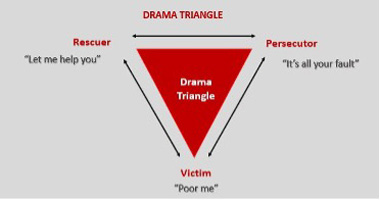by Joanie Bentz, B.S., M.Ed., LBS
The “Drama Triangle,” also known as the “Victim Triangle,” is a social model of human interaction developed by a psychologist named Stephen Carpman in 1968. It is a power game where individuals consciously or unconsciously choose the role of Persecutor, Rescuer, or Victim, depending on the context of the situation.
I came across this model while conducting research on Cognitive Behavioral Therapy, which is a method that mental health clinicians like me often use to assist their clients. It’s a process of logically challenging the validity of their thoughts by putting them “on trial.”
The Drama Triangle is closely related to psuedomutuality, which describes an unhealthy dynamic of ignoring relationship issues and avoiding conflict openly (please see my previous article, Pseudomutality in the narcissistic family,). It is a map or model used to describe destructive interpersonal dynamics and how people operate in those dysfunctional relationships.
The Drama Triangle looks like this:

Carpman’s three roles
According to Carpman’s model, the three roles are identified by the following:
Victim – “Poor me.”
Victims feel like they never receive a fair shake in life. They identify themselves as incapable and blame the Persecutors (people or situations). Rescuers are their go-to when they need a particular crutch for whatever problematic situation arises. They can remain stuck in this mode indefinitely and never rise above it to learn adequate problem-solving skills and adapt to changes.
Rescuer – “Let me help you.”
Rescuers are so busy putting out other people’s fires that they are typically exhausted, disorganized, and forgetful. They are constantly speaking for the Victim and giving the Victim unsolicited advice, sometimes to the point of doing all the physical and emotional work for the Victim. A parent enabling a child with behavioral issues and preventing healthy individuation can fall under this category. Sometimes, intentions may start off good, but they keep Victims dependent on their assistance and the Victims fail to address their own needs or learn from their mistakes.
Persecutor – “It’s all your fault.”
Persecutors are overbearing and often have unreasonable rules and limits that they impose on others.
Persecutors blame the Victims and criticize the behavior of Rescuers, without providing genuinely helpful advice and guidance. They want to be right for the sake of being right. Persecutors are bullies because they need to control others. They do not like being confronted about a possible error in their judgment and may go into a rage if challenged.
Narcissists and the Drama Triangle
Carpman’s model implies that narcissists and other personality-disordered individuals typically live daily in the Drama Triangle. They can be found anywhere in the triangle, depending on their needs in the moment.
Narcissists as Persecutor
When the narcissists act as the Persecutor, they are in an angry mode and are blaming you, so you take on all the guilt and shame. They often will try to exploit your weaknesses and mistakes. Their job is to oppress and control. A parent who abuses a child is a Persecutor.
However, they don’t respond well to being identified as the Persecutor. This is counterproductive to the desired outcome of painting a picture of a flawless person, because we all know they are perfect and never would dehumanize anyone. On the contrary, the Victim mentality gives them a chance to create a false self that is worthy of praise and admiration.
Narcissists as the Rescuer
In and of itself, being a Rescuer for someone is not a bad thing. But when it serves the narcissist’s ego, it can be a cleverly employed tool. The narcissist will take on what I would like to call the ‘malignant hero” façade when it serves a specific end for the narcissist.
There is a term called “hero syndrome” that you often hear about in the nursing field. It is like the Rescuer in that the narcissist creates a problem, and then comes to the aid of the true victim, to receive positive fuel (attention, support, accolades) to keep them going. Some nurses with this syndrome have brought their patients to the brink of death, and then helped the patients recover, which in their own warped minds, elevated then to God-like status. They need victims and will continue this pathological behavior until caught.
Read more: What is narcissistic supply?
Often the Rescuer is intrusive and will place themselves in your difficulties so that they can direct, advise, and guide without you asking. Later, you will have to admit they did help you and that the only reason you are doing better is because of their excellent advice and guidance.
Narcissists as the Victim
Each role serves a specific function, but which one in your estimation is often used by the narcissist?
If you guessed victim, you guessed right. Narcissists are the self-appointed perpetual victims in any situation where they may be held accountable for their abusive behaviors.
Victim mentality serves several purposes. You may see the narcissist act like a wounded child. When a narcissist deflects and puts the blame on others, this garners attention and sympathy from the poor duped souls who think that the narcissist has been wronged in some way. This mentality will gain them supporters and admirers. The narcissist is a master storyteller and may manipulate others into feeling that the narcissist was falsely accused or exploited by jealous enemies.
Being a professional Victim is something to be enjoyed because the narcissist finds it entertaining to lie and exaggerate. This behavior is a type of emotional fuel to keep boredom from setting in as well. Hence, the “drama.” Victims in this mode never learn to help themselves.
Fear of living an authentic life
When a narcissist takes on these roles, the intention is self-serving. They see you as having no rights. No right to disagree with them, challenge them or call them out in any way. These are all affronts to their ego, and they must take on one of these roles so that the truth of who they really are never surfaces.
Learn more: Understanding and recognizing narcissistic abuse




































 What happens to your brain with PTSD, and a promising technique to fix it
What happens to your brain with PTSD, and a promising technique to fix it
jhmb6
Nice to see this topic covered and the most deceitful role a narcopath plays is the rescuer, in my opinion. Once the narc establishes himself or herself as a credible hero/idol helper/advocate, it’s almost always impossible to convince others that what they are dealing with is a pathological manipulator. Until they day the narc dies, the narc has everyone fooled.